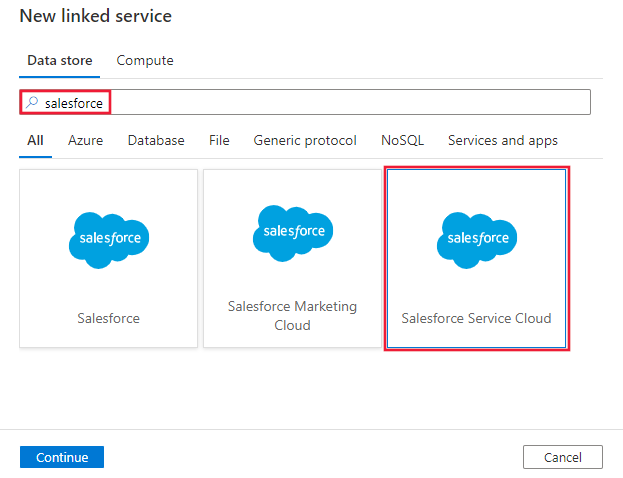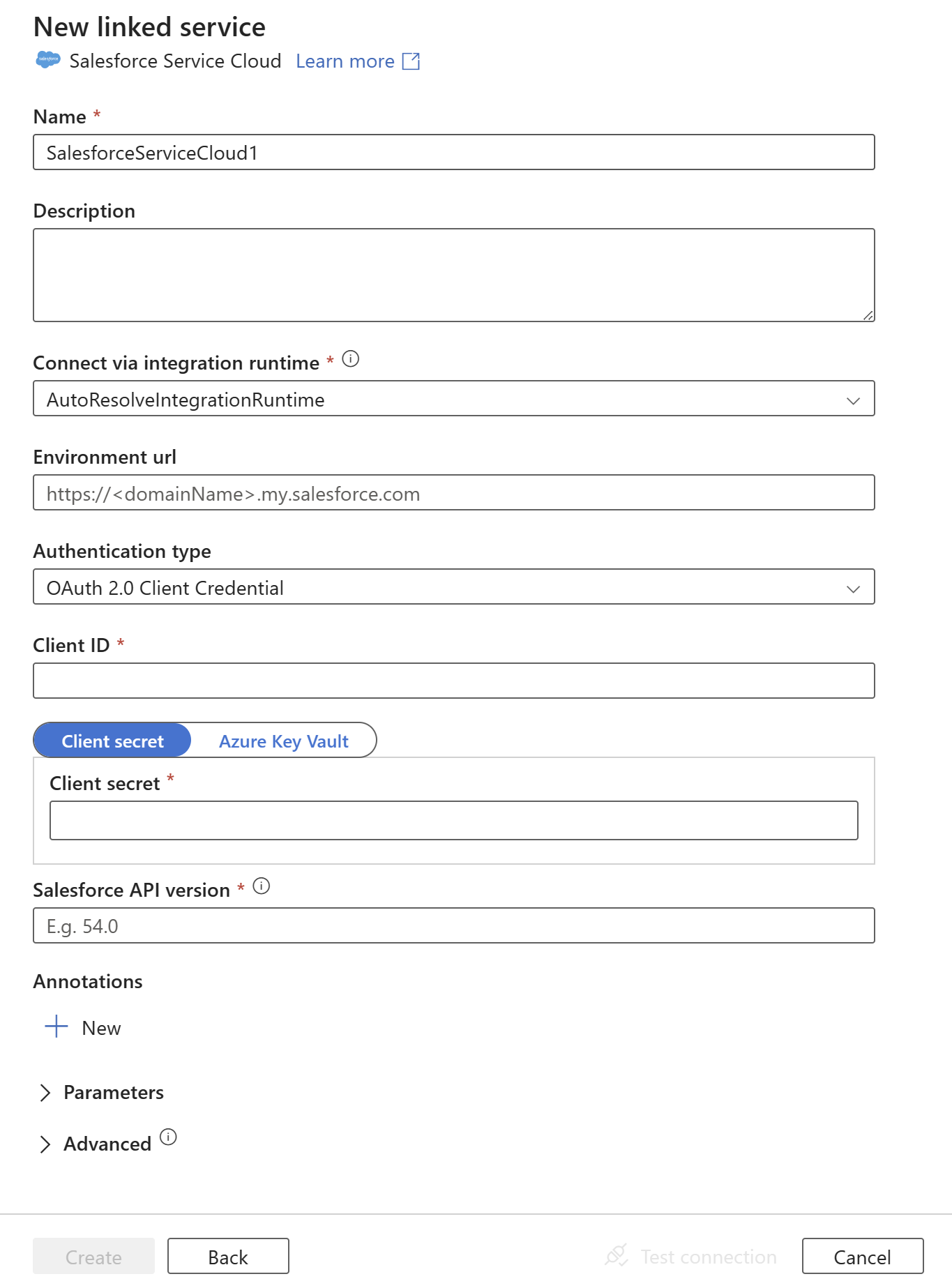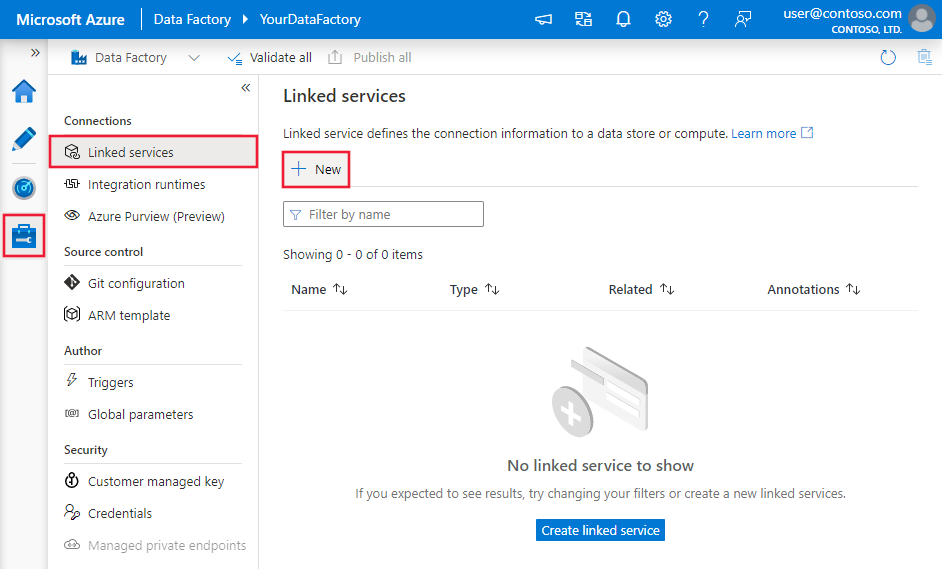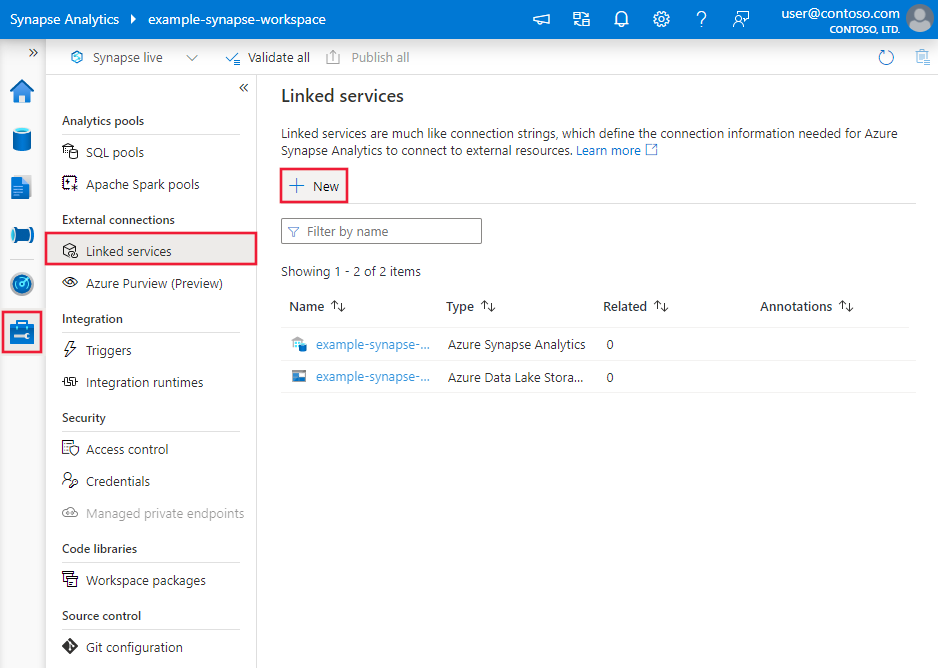Copy data from and to Salesforce Service Cloud using Azure Data Factory or Azure Synapse Analytics
APPLIES TO:  Azure Data Factory
Azure Data Factory  Azure Synapse Analytics
Azure Synapse Analytics
Tip
Try out Data Factory in Microsoft Fabric, an all-in-one analytics solution for enterprises. Microsoft Fabric covers everything from data movement to data science, real-time analytics, business intelligence, and reporting. Learn how to start a new trial for free!
This article outlines how to use Copy Activity in Azure Data Factory and Azure Synapse pipelines to copy data from and to Salesforce Service Cloud. It builds on the Copy Activity overview article that presents a general overview of the copy activity.
Important
The new Salesforce Service Cloud connector provides improved native Salesforce Service Cloud support. If you are using the legacy Salesforce Service Cloud connector in your solution, supported as-is for backward compatibility only, refer to Salesforce Service Cloud connector (legacy) article.
Supported capabilities
This Salesforce Service Cloud connector is supported for the following capabilities:
| Supported capabilities | IR |
|---|---|
| Copy activity (source/sink) | ① ② |
| Lookup activity | ① ② |
① Azure integration runtime ② Self-hosted integration runtime
For a list of data stores that are supported as sources or sinks, see the Supported data stores table.
Specifically, this Salesforce Service Cloud connector supports:
- Salesforce Developer, Professional, Enterprise, or Unlimited editions.
- Copying data from and to custom domain (Custom domain can be configured in both production and sandbox environments).
You can explicitly set the API version used to read/write data via apiVersion property in linked service. When copying data to Salesforce Service Cloud, the connector uses BULK API 2.0.
Prerequisites
API permission must be enabled in Salesforce.
You need configure the Connected Apps in Salesforce portal referring to this official doc or our step by step guideline in the recommendation in this article.
Important
- The execution user must have the API Only permission.
- Access Token expire time could be changed through session policies instead of the refresh token.
Salesforce Bulk API 2.0 Limits
We use Salesforce Bulk API 2.0 to query and ingest data. In Bulk API 2.0, batches are created for you automatically. You can submit up to 15,000 batches per rolling 24-hour period. If batches exceed the limit, you will see failures.
In Bulk API 2.0, only ingest jobs consume batches. Query jobs don't. For details, see How Requests Are Processed in the Bulk API 2.0 Developer Guide.
For more information, see the "General Limits" section in Salesforce developer limits.
Get started
To perform the Copy activity with a pipeline, you can use one of the following tools or SDKs:
- The Copy Data tool
- The Azure portal
- The .NET SDK
- The Python SDK
- Azure PowerShell
- The REST API
- The Azure Resource Manager template
Create a linked service to Salesforce Service Cloud using UI
Use the following steps to create a linked service to Salesforce Service Cloud in the Azure portal UI.
Browse to the Manage tab in your Azure Data Factory or Synapse workspace and select Linked Services, then click New:
Search for Salesforce and select the Salesforce Service Cloud connector.

Configure the service details, test the connection, and create the new linked service.

Connector configuration details
The following sections provide details about properties that are used to define entities specific to the Salesforce Service Cloud connector.
Linked service properties
The following properties are supported for the Salesforce Service Cloud linked service.
| Property | Description | Required |
|---|---|---|
| type | The type property must be set to SalesforceServiceCloudV2. | Yes |
| environmentUrl | Specify the URL of the Salesforce Service Cloud instance. For example, specify "https://<domainName>.my.salesforce.com" to copy data from the custom domain. Learn how to configure or view your custom domain referring to this article. |
Yes |
| authenticationType | Type of authentication used to connect to the Salesforce Service Cloud. The allowed value is OAuth2ClientCredentials. |
Yes |
| clientId | Specify the client ID of the Salesforce OAuth 2.0 Connected App. For more information, go to this article | Yes |
| clientSecret | Specify the client secret of the Salesforce OAuth 2.0 Connected App. For more information, go to this article | Yes |
| apiVersion | Specify the Salesforce Bulk API 2.0 version to use, e.g. 52.0. The Bulk API 2.0 only supports API version >= 47.0. To learn about Bulk API 2.0 version, see article. If you use a lower API version, it will result in a failure. |
Yes |
| connectVia | The integration runtime to be used to connect to the data store. If not specified, it uses the default Azure Integration Runtime. | No |
Example: Store credentials
{
"name": "SalesforceServiceCloudLinkedService",
"properties": {
"type": "SalesforceServiceCloudV2",
"typeProperties": {
"environmentUrl": "<environment URL>",
"authenticationType": "OAuth2ClientCredentials",
"clientId": "<client ID>",
"clientSecret": {
"type": "SecureString",
"value": "<client secret>"
},
"apiVersion": "<API Version>"
},
"connectVia": {
"referenceName": "<name of Integration Runtime>",
"type": "IntegrationRuntimeReference"
}
}
}
Example: Store credentials in Key Vault
{
"name": "SalesforceServiceCloudLinkedService",
"properties": {
"type": "SalesforceServiceCloudV2",
"typeProperties": {
"environmentUrl": "<environment URL>",
"authenticationType": "OAuth2ClientCredentials",
"clientId": "<client ID>",
"clientSecret": {
"type": "AzureKeyVaultSecret",
"secretName": "<secret name of client secret in AKV>",
"store":{
"referenceName": "<Azure Key Vault linked service>",
"type": "LinkedServiceReference"
}
},
"apiVersion": "<API Version>"
},
"connectVia": {
"referenceName": "<name of Integration Runtime>",
"type": "IntegrationRuntimeReference"
}
}
}
Dataset properties
For a full list of sections and properties available for defining datasets, see the Datasets article. This section provides a list of properties supported by the Salesforce Service Cloud dataset.
To copy data from and to Salesforce Service Cloud, set the type property of the dataset to SalesforceServiceCloudV2Object. The following properties are supported.
| Property | Description | Required |
|---|---|---|
| type | The type property must be set to SalesforceServiceCloudV2Object. | Yes |
| objectApiName | The Salesforce Service Cloud object name to retrieve data from. | No for source (if "SOQLQuery" in source is specified), Yes for sink |
| reportId | The ID of the Salesforce Service Cloud report to retrieve data from. It is not supported in sink. Note that there are limitations when you use reports. | No for source (if "SOQLQuery" in source is specified), not support sink |
Important
The "__c" part of API Name is needed for any custom object.

Example:
{
"name": "SalesforceServiceCloudDataset",
"properties": {
"type": "SalesforceServiceCloudV2Object",
"typeProperties": {
"objectApiName": "MyTable__c"
},
"schema": [],
"linkedServiceName": {
"referenceName": "<Salesforce Service Cloud linked service name>",
"type": "LinkedServiceReference"
}
}
}
Copy activity properties
For a full list of sections and properties available for defining activities, see the Pipelines article. This section provides a list of properties supported by Salesforce Service Cloud source and sink.
Salesforce Service Cloud as a source type
To copy data from Salesforce Service Cloud, set the source type in the copy activity to SalesforceServiceCloudV2Source. The following properties are supported in the copy activity source section.
| Property | Description | Required |
|---|---|---|
| type | The type property of the copy activity source must be set to SalesforceServiceCloudV2Source. | Yes |
| SOQLQuery | Use the custom query to read data. You can only use Salesforce Object Query Language (SOQL) query with limitations. For SOQL limitations, see this article. If query is not specified, all the data of the Salesforce object specified in "ObjectApiName/reportId" in dataset will be retrieved. | No (if "ObjectApiName/reportId" in the dataset is specified) |
| includeDeletedObjects | Indicates whether to query the existing records, or query all records including the deleted ones. If not specified, the default behavior is false. Allowed values: false (default), true. |
No |
Important
The "__c" part of API Name is needed for any custom object.

Example:
"activities":[
{
"name": "CopyFromSalesforceServiceCloud",
"type": "Copy",
"inputs": [
{
"referenceName": "<Salesforce Service Cloud input dataset name>",
"type": "DatasetReference"
}
],
"outputs": [
{
"referenceName": "<output dataset name>",
"type": "DatasetReference"
}
],
"typeProperties": {
"source": {
"type": "SalesforceServiceCloudV2Source",
"SOQLQuery": "SELECT Col_Currency__c, Col_Date__c, Col_Email__c FROM AllDataType__c",
"includeDeletedObjects": false
},
"sink": {
"type": "<sink type>"
}
}
}
]
Salesforce Service Cloud as a sink type
To copy data to Salesforce Service Cloud, set the sink type in the copy activity to SalesforceServiceCloudV2Sink. The following properties are supported in the copy activity sink section.
| Property | Description | Required |
|---|---|---|
| type | The type property of the copy activity sink must be set to SalesforceServiceCloudV2Sink. | Yes |
| writeBehavior | The write behavior for the operation. Allowed values are Insert and Upsert. |
No (default is Insert) |
| externalIdFieldName | The name of the external ID field for the upsert operation. The specified field must be defined as "External ID Field" in the Salesforce Service Cloud object. It can't have NULL values in the corresponding input data. | Yes for "Upsert" |
| writeBatchSize | The row count of data written to Salesforce Service Cloud in each batch. Suggest set this value from 10,000 to 200,000. Too few rows in each batch will reduce the copy performance. Too many rows in each batch may cause API timeout. | No (default is 100,000) |
| ignoreNullValues | Indicates whether to ignore NULL values from input data during a write operation. Allowed values are true and false. - True: Leave the data in the destination object unchanged when you do an upsert or update operation. Insert a defined default value when you do an insert operation. - False: Update the data in the destination object to NULL when you do an upsert or update operation. Insert a NULL value when you do an insert operation. |
No (default is false) |
| maxConcurrentConnections | The upper limit of concurrent connections established to the data store during the activity run. Specify a value only when you want to limit concurrent connections. | No |
Example: Salesforce Service Cloud sink in a copy activity
"activities":[
{
"name": "CopyToSalesforceServiceCloud",
"type": "Copy",
"inputs": [
{
"referenceName": "<input dataset name>",
"type": "DatasetReference"
}
],
"outputs": [
{
"referenceName": "<Salesforce Service Cloud output dataset name>",
"type": "DatasetReference"
}
],
"typeProperties": {
"source": {
"type": "<source type>"
},
"sink": {
"type": "SalesforceServiceCloudV2Sink",
"writeBehavior": "Upsert",
"externalIdFieldName": "CustomerId__c",
"writeBatchSize": 10000,
"ignoreNullValues": true
}
}
}
]
Data type mapping for Salesforce Service Cloud
When you copy data from Salesforce Service Cloud, the following mappings are used from Salesforce Service Cloud data types to interim data types within the service internally. To learn about how the copy activity maps the source schema and data type to the sink, see Schema and data type mappings.
| Salesforce Service Cloud data type | Service interim data type |
|---|---|
| Auto Number | String |
| Checkbox | Boolean |
| Currency | Decimal |
| Date | DateTime |
| Date/Time | DateTime |
| String | |
| ID | String |
| Lookup Relationship | String |
| Multi-Select Picklist | String |
| Number | Decimal |
| Percent | Decimal |
| Phone | String |
| Picklist | String |
| Text | String |
| Text Area | String |
| Text Area (Long) | String |
| Text Area (Rich) | String |
| Text (Encrypted) | String |
| URL | String |
Note
Salesforce Service Cloud Number type is mapping to Decimal type in Azure Data Factory and Azure Synapse pipelines as a service interim data type. Decimal type honors the defined precision and scale. For data whose decimal places exceeds the defined scale, its value will be rounded off in preview data and copy. To avoid getting such precision loss in Azure Data Factory and Azure Synapse pipelines, consider increasing the decimal places to a reasonably large value in Custom Field Definition Edit page of Salesforce Service Cloud.
Lookup activity properties
To learn details about the properties, check Lookup activity.
Upgrade the Salesforce Service Cloud linked service
Here are steps that help you upgrade your linked service and related queries:
Configure the connected apps in Salesforce portal by referring to Prerequisites.
Create a new Salesforce Service Cloud linked service and configure it by referring to Linked service properties.
If you use SQL query in the copy activity source or the lookup activity that refers to the legacy linked service, you need to convert them to the SOQL query. Learn more about SOQL query from Salesforce Service Cloud as a source type and Salesforce Object Query Language (SOQL).
readBehavior is replaced with includeDeletedObjects in the copy activity source or the lookup activity. For the detailed configuration, see Salesforce Service Cloud as a source type.
Related content
For a list of data stores supported as sources and sinks by the copy activity, see Supported data stores.
Feedback
Coming soon: Throughout 2024 we will be phasing out GitHub Issues as the feedback mechanism for content and replacing it with a new feedback system. For more information see: https://aka.ms/ContentUserFeedback.
Submit and view feedback for

